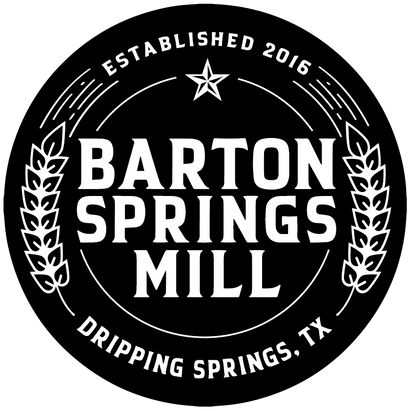Add description, images, menus and links to your mega menu
A column with no settings can be used as a spacer
Link to your collections, sales and even external links
Add up to five columns
Add description, images, menus and links to your mega menu
A column with no settings can be used as a spacer
Link to your collections, sales and even external links
Add up to five columns
Add description, images, menus and links to your mega menu
A column with no settings can be used as a spacer
Link to your collections, sales and even external links
Add up to five columns
Add description, images, menus and links to your mega menu
A column with no settings can be used as a spacer
Link to your collections, sales and even external links
Add up to five columns
About the Mill
 Our story starts long ago with a man named William “Uncle Billy” Barton. It was only a year after the Texas Revolution when Uncle Billy Barton had the wherewithal to patent four springs just south of what is now Lady Bird Lake in Austin. He named three of them after his daughters, whose names are worth mentioning because, well, they are the memorable Parthenia, Eliza, and Zenobia. Parthenia flows into Barton Springs Pool, entering just below the diving board. We are all grateful to her for her daily contribution to the quality of life in Austin, her bracing, clean water bringing joy to all who jump in.
Our story starts long ago with a man named William “Uncle Billy” Barton. It was only a year after the Texas Revolution when Uncle Billy Barton had the wherewithal to patent four springs just south of what is now Lady Bird Lake in Austin. He named three of them after his daughters, whose names are worth mentioning because, well, they are the memorable Parthenia, Eliza, and Zenobia. Parthenia flows into Barton Springs Pool, entering just below the diving board. We are all grateful to her for her daily contribution to the quality of life in Austin, her bracing, clean water bringing joy to all who jump in.
So, yes, we love Parethenia. But in terms of milling contributions and our namesake, we give the highest of honors to Zenobia and Eliza Barton, whose waters fueled Michael Paggi’s gristmill for Central Texas corn and Michael and Robert English’s larger mill for flour. The English’s business boasted two 48-inch mills capable of producing 100 barrels and 1960 pounds per day. (For reference, our mill can run 165 pounds per hour and 1650 pounds in a 10-hour day.) In 1886, a fire destroyed the English’s flour mill on Eliza Spring. Today, Eliza is a protected habitat for endangered salamanders and Zenobia flows into Austin’s protected Sunken Garden Spring.
Like Paggi and English before us, we specialize in stone-milled heirloom and landrace grains, many grown here in Texas since the late 1800s. In a nod to the many kernels of corn and berries of wheat that were milled by power from Barton’s springs, we chose the name Barton Springs Mill.
Our first mill is a Osttiroler from Austria, and it currently runs 10 hours a day, 7 days a week—4 days for culinary and baking, and 3 for distilling and brewing. It is made of solid wood and stone, with an industrial motor. In the summer of 2019, we added a real workhorse of a mill, a larger Osttiroler, that churns through 300 pounds of berries per hour, bringing our capacity to 4650 pounds per 10-hour day.
But new mills aside, we’d have nothing to mill if it weren’t for our farmers. We work hand-in-hand with them, acting as our own seedsman and providing our seed stock directly to the growers. The resulting crops come straight from the combine to our door, where we clean and bag whole berries in one-ton totes. (Yes, those are very big bags.) We mill on-demand for our wholesale customers, retailers, online customers, and farmers’ markets, ensuring the freshest of the fresh flours for your kitchen. Send us pictures of the finished goods. Every single one makes us so very happy.
